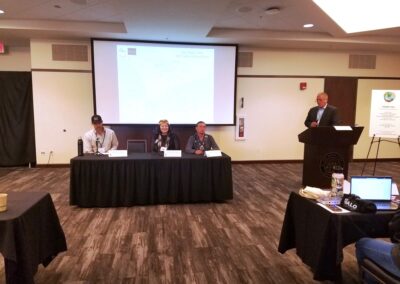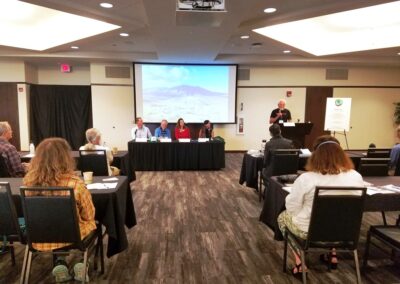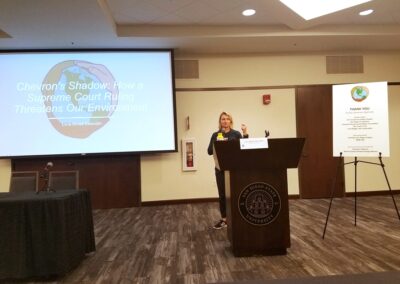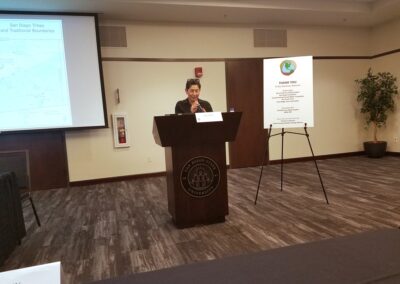8th Annual Environmental Leadership Summit
September 28, 2024
“Voices of the Land: Engaging Communities for Environmental Change”
The 8th Annual Environmental Leadership Summit brought together a diverse group of leaders, innovators, and advocates committed to advancing sustainability and environmental stewardship. Over the course of the event, attendees participated in thought-provoking discussions and networking opportunities that highlighted the latest trends and challenges in the environmental sector.
Tribal keynote speakers shared inspiring stories of Tribal Ecological Knowledge that have made a tangible impact on local and global scales. Panel discussions focused on critical issues such as working with Indigenous Tribes, climate change, along with discussions of current ballot initiatives that will directly impact our environmental goals. Participants also engaged in discussions aimed at developing actionable strategies for fostering environmental resilience.
The summit underscored the importance of collective action and the role of leadership in driving meaningful change. With a renewed sense of purpose, attendees left the summit equipped with new insights, connections, and a commitment to continue their efforts in creating a more sustainable future. Overall, the event was a resounding success, reinforcing the necessity of ongoing dialogue and collaboration in the pursuit of environmental leadership.
Provided by Bridget Darrah:
“This years’ Environmental Leadership Summit’s centralizing theme was, “Voices of the Land: Engaging Communities for Environmental Change.”
The moving invocation was given by Chairwoman Erica Pinto of the Jamul Indian Village, who highlighted the struggles facing indigenous communities in California. She emphasized the significance of the Jamul recent expansion, almost doubling the reservation’s acreage, and reflected on ongoing efforts to reclaim land and restore trust broken by injustice.
Jill Sherman-Warne then spoke as the Summit’s keynote speaker, and discussed the importance of working with tribes as a catalyst for change and healthier waters and air. She also highlighted the importance of land back is more than acknowledgement but its’ actions between transfers of lands that holds value.
Panel 1: Tribal Civil Engagement.
This panel featured Bobby Wallace, Jeremy Zagarella, and Jill Sherman-Warne, who all discussed the role of indigenous people in climate change, and how this could evolve and change in terms of dealing with government agencies. The discussion circled around the understanding to remember that building mutual trust and relationships are incredibly important, and different tribal nations would need different things to earn that trust.
Panel 2: The Climate Crisis: Local Actions with Global Implications.
The second panel was held by Peter Anderson, Josh Chatten-Brown, Nicole Capretz, and Tom English who talked of some pressing issues posed by climate change. The participants pointed out that increasing natural disasters pose the greatest threat to stability. They discussed the importance of effective communication and litigation. Specifically the context of San Diego’s climate action plans impact of snowballing to create national change. Groundbreaking work on renewable energy initiatives and challenges of navigating the “fog” of climate change were highlighted in this panel.
Panel 3: Will These Initiatives Save the Planet? Or Not?
The final panel of the summit included Sophia Carrasco, Enrique De La Cruz, and Ann Van Leer, focusing on proposed measures on upcoming ballots, and how this would impact climate change. They discussed Measure G, which seeks to enhance public transit, and Prop 4, a $10 million bond for climate and environmental projects in San Diego. Prop 5 aims to simplify funding for infrastructure and affordable housing, reducing the necessary vote threshold for approval from a ⅔ vote to 55%. Participants asked questions about the measures, inspecting all sides to ensure a collective understanding of both the pros and cons of each.
The summit served as a platform for discussion on the intersection of indigenous rights, environmental stewardship, and community resilience in the face of climate change.
Phone:
805-835-1833
Email:
contactecosd@gmail.com






